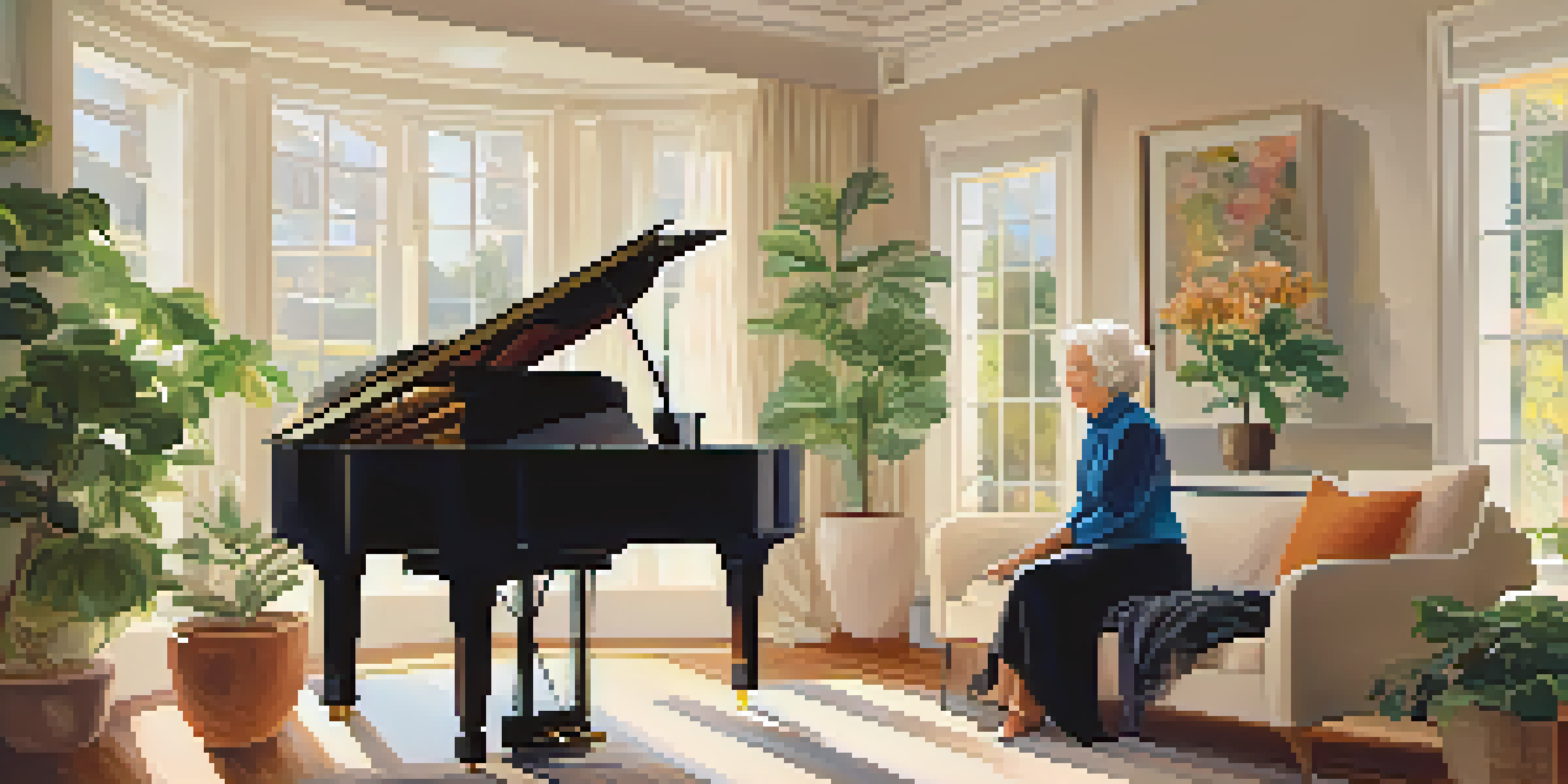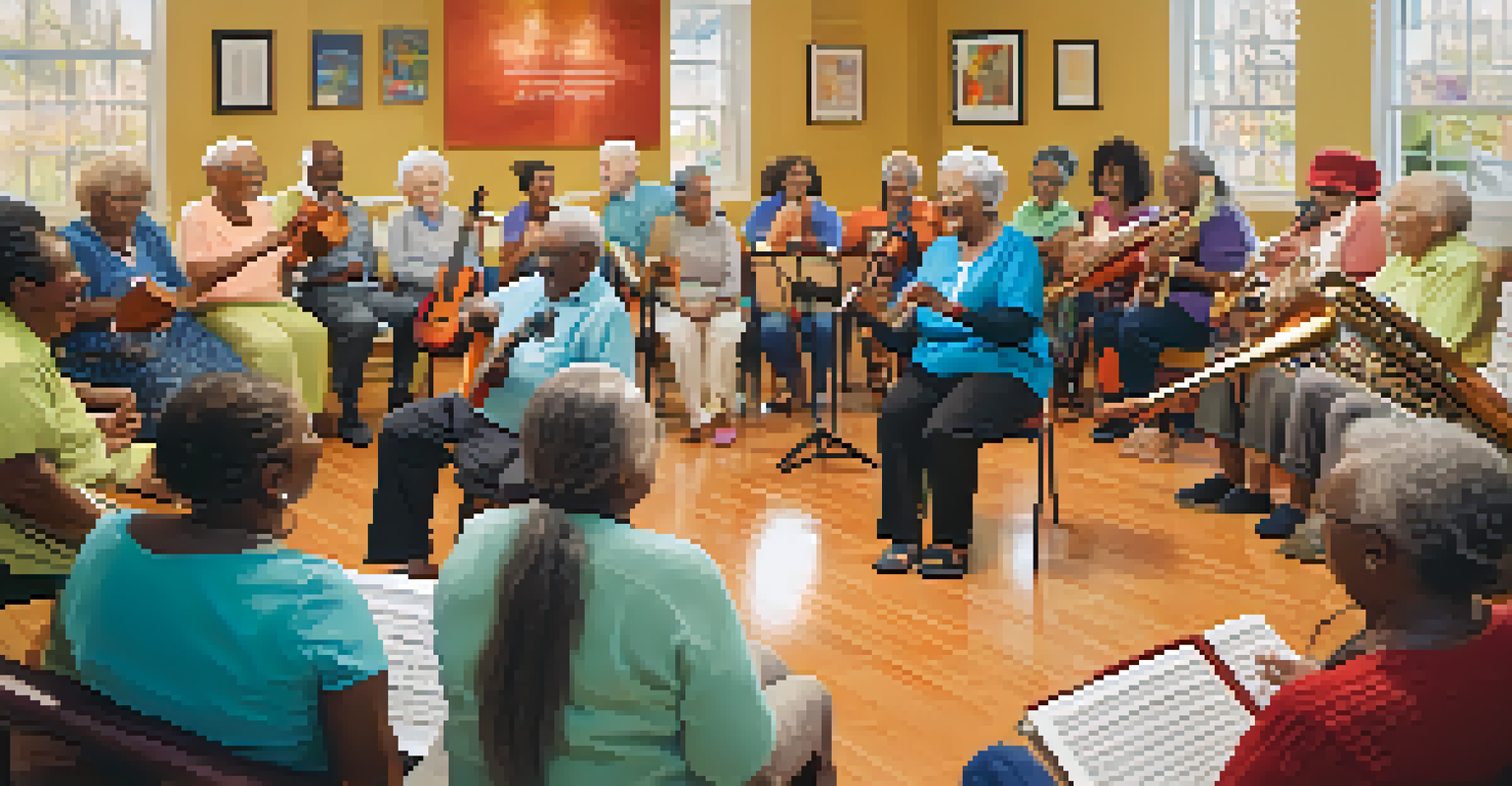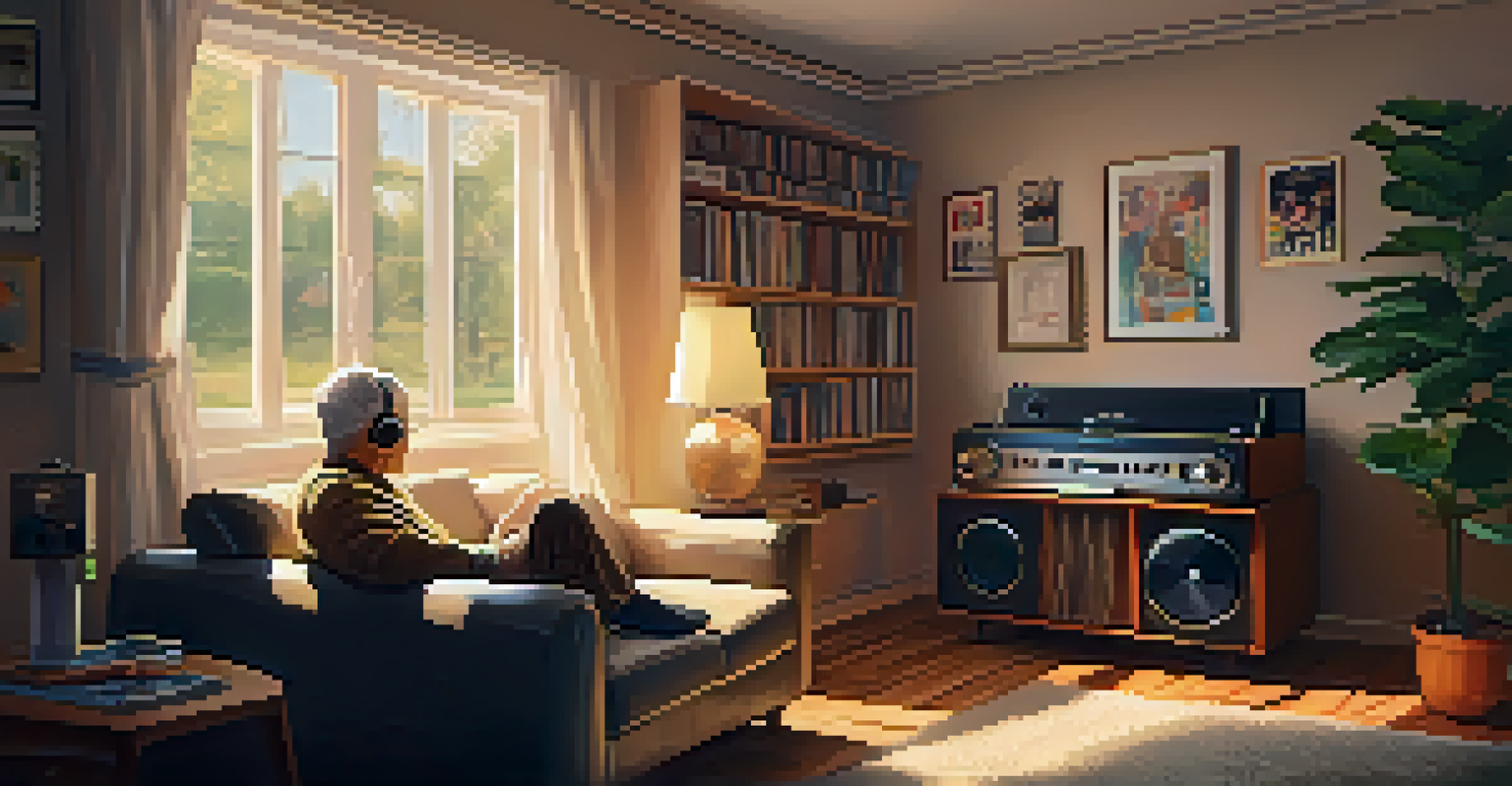Music as a Means of Self-Expression for Seniors

The Power of Music in Senior Lives
Music has a unique ability to evoke emotions and memories, making it a powerful tool for self-expression. For seniors, it can serve as a bridge to their past, allowing them to articulate feelings that words sometimes fail to capture. Whether it's through listening, singing, or playing instruments, music provides an outlet for creativity and emotional release.
Music can change the world because it can change people.
Engaging with music can also enhance mental well-being. Research shows that it can reduce feelings of loneliness and depression, which are common among seniors. As they connect with familiar tunes or explore new genres, they often find joy and comfort, reinforcing the idea that music is more than just sound—it's a lifeline.
Moreover, music encourages social interaction. Group activities like sing-alongs or music therapy sessions foster connections with others, creating a sense of community. This social aspect is vital as it combats isolation, helping seniors feel more engaged and supported.
Personal Stories: Music in Daily Life
Many seniors have inspiring stories about how music has impacted their lives. For instance, consider a retired teacher who found solace in playing the piano after her husband passed away. Each note became a way for her to express her grief and eventually transform it into a celebration of life, illustrating how deeply personal and healing music can be.

Another example is a group of friends who meet weekly for a jam session. They play everything from classic rock to jazz, sharing laughs and memories of their youth. This camaraderie not only keeps their spirits high but also allows them to express their identities through the music they love.
Music Enhances Senior Well-Being
Engaging with music can significantly improve mental health, reduce feelings of loneliness, and foster social connections among seniors.
These anecdotes highlight that music isn't just a pastime; it's a vital part of their life stories. By sharing their experiences, seniors not only connect with others but also affirm their individuality, showcasing how music can be an essential avenue for self-expression.
Different Ways Seniors Can Engage with Music
There are numerous ways for seniors to incorporate music into their lives. Listening to favorite albums or playlists can provide a daily dose of nostalgia and comfort. Streaming services now offer curated playlists designed specifically for older adults, making it easy to explore various genres and eras.
Where words fail, music speaks.
For those looking to get more hands-on, joining a local choir or music class can be incredibly rewarding. Many community centers offer programs tailored for seniors, where they can learn to play an instrument or improve their vocal skills. This not only fosters creativity but also builds new friendships.
Lastly, technology has made it easier than ever to create and share music. Seniors can record their own songs or even collaborate with family members online. This modern twist on musical expression allows them to connect with loved ones while exploring their creative side.
The Therapeutic Benefits of Music
Music therapy is a recognized practice that offers numerous benefits for seniors. It helps improve cognitive function, reduce anxiety, and promote overall emotional health. Therapists use music to engage seniors in various activities, from singing to rhythmic exercises, which can stimulate both the mind and body.
Furthermore, music can trigger memories for individuals with dementia or Alzheimer's disease. Familiar melodies often spark recognition and can lead to meaningful conversations about the past. This connection to their history can be incredibly comforting and grounding for seniors facing cognitive challenges.
Personal Stories Highlight Impact
Seniors' personal experiences with music showcase its profound ability to aid emotional expression and create lasting friendships.
Additionally, music therapy sessions often provide a safe space for emotional expression. Seniors can explore their feelings and experiences through music, leading to greater self-awareness and healing. It's a powerful reminder that music can be both a personal journey and a therapeutic tool.
Creating a Musical Environment at Home
Transforming your home into a musical haven can significantly enhance a senior's quality of life. Simple changes like keeping a record player or a Bluetooth speaker accessible can encourage spontaneous listening sessions. Having a variety of music genres on hand can also cater to different moods and preferences.
Incorporating music into daily routines is another way to elevate the experience. Playing soothing background music during meals or lively tunes during activities can create a pleasant atmosphere. This not only enriches their environment but also makes everyday moments more enjoyable.
Lastly, involving family members in musical activities can strengthen bonds. Whether it's playing a favorite song together or sharing musical memories, these shared experiences foster connection and joy, proving that music truly brings people together.
Overcoming Barriers to Musical Engagement
While music can be a wonderful form of self-expression, some seniors may face barriers to engagement. Physical limitations, such as arthritis or hearing loss, can make it challenging to participate fully. However, there are adaptive tools and technologies available that can help seniors overcome these obstacles.
For instance, there are user-friendly instruments designed specifically for those with limited mobility. These instruments can still produce beautiful sounds, allowing seniors to express themselves musically without frustration. Additionally, hearing aids or assistive listening devices can enhance their ability to enjoy music.
Future Opportunities in Music
Advancements in technology and community programs promise to expand music engagement options for seniors, promoting creativity and connection.
It's also vital to create an encouraging environment. Family and caregivers can play a significant role in motivating seniors to explore music, ensuring they feel supported and empowered. With the right resources and encouragement, seniors can enjoy the myriad benefits that music offers.
The Future of Music Engagement for Seniors
As we look to the future, the role of music in the lives of seniors is likely to grow even more significant. With advancements in technology, there are increasing opportunities for seniors to engage with music in innovative ways. Virtual concerts and online music classes can make it easier for them to explore new genres and connect with artists from around the world.
Moreover, communities are beginning to recognize the value of music programs tailored for older adults. More organizations are investing in music therapy and performance opportunities, acknowledging that music can enrich seniors' lives. This shift highlights a broader understanding of the importance of creative expression at any age.

Ultimately, as society continues to embrace music as a vital form of self-expression, seniors can look forward to a future filled with opportunities for creativity, connection, and joy. The journey of musical exploration is never-ending, proving that it's never too late to find your voice through music.